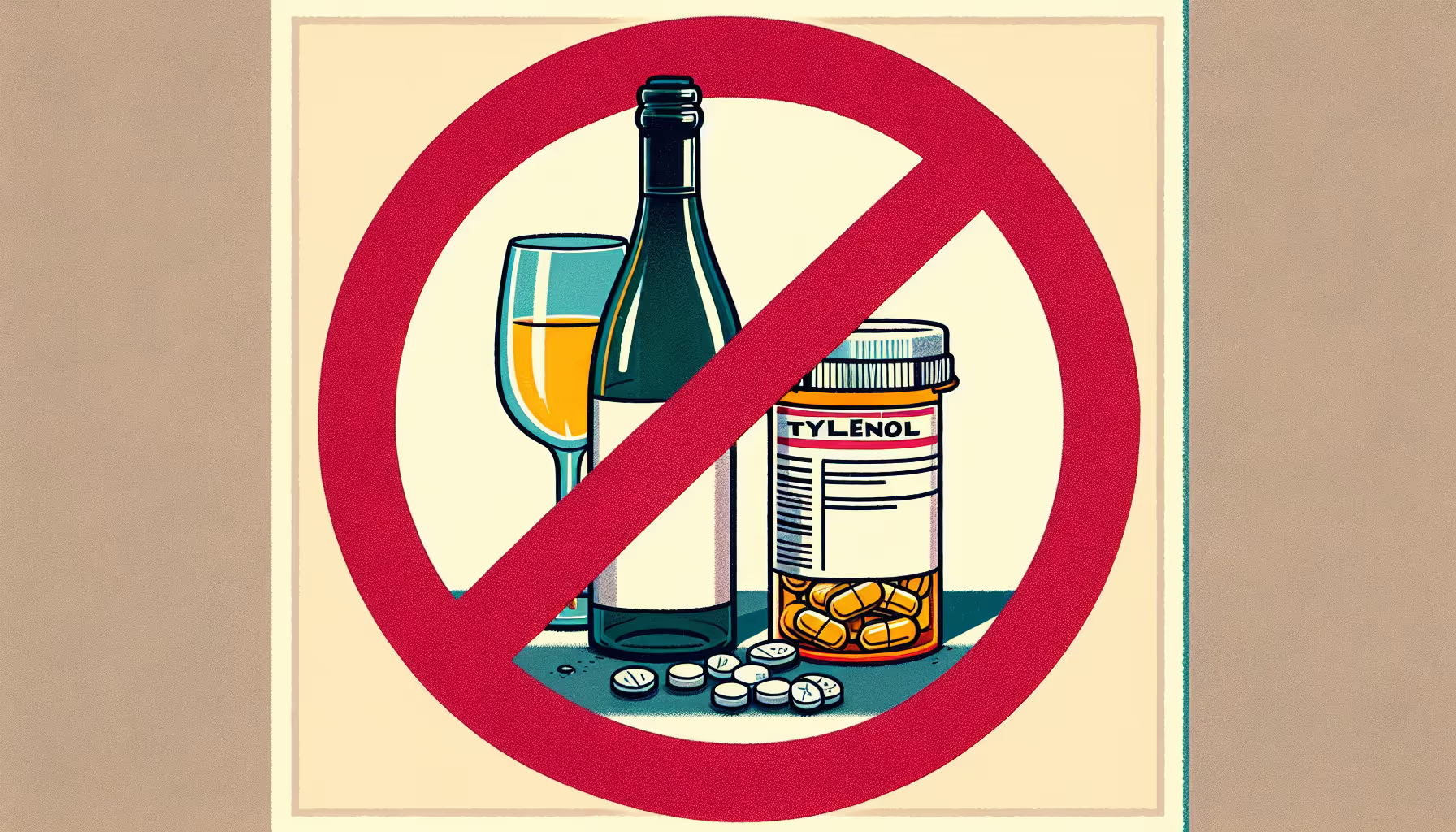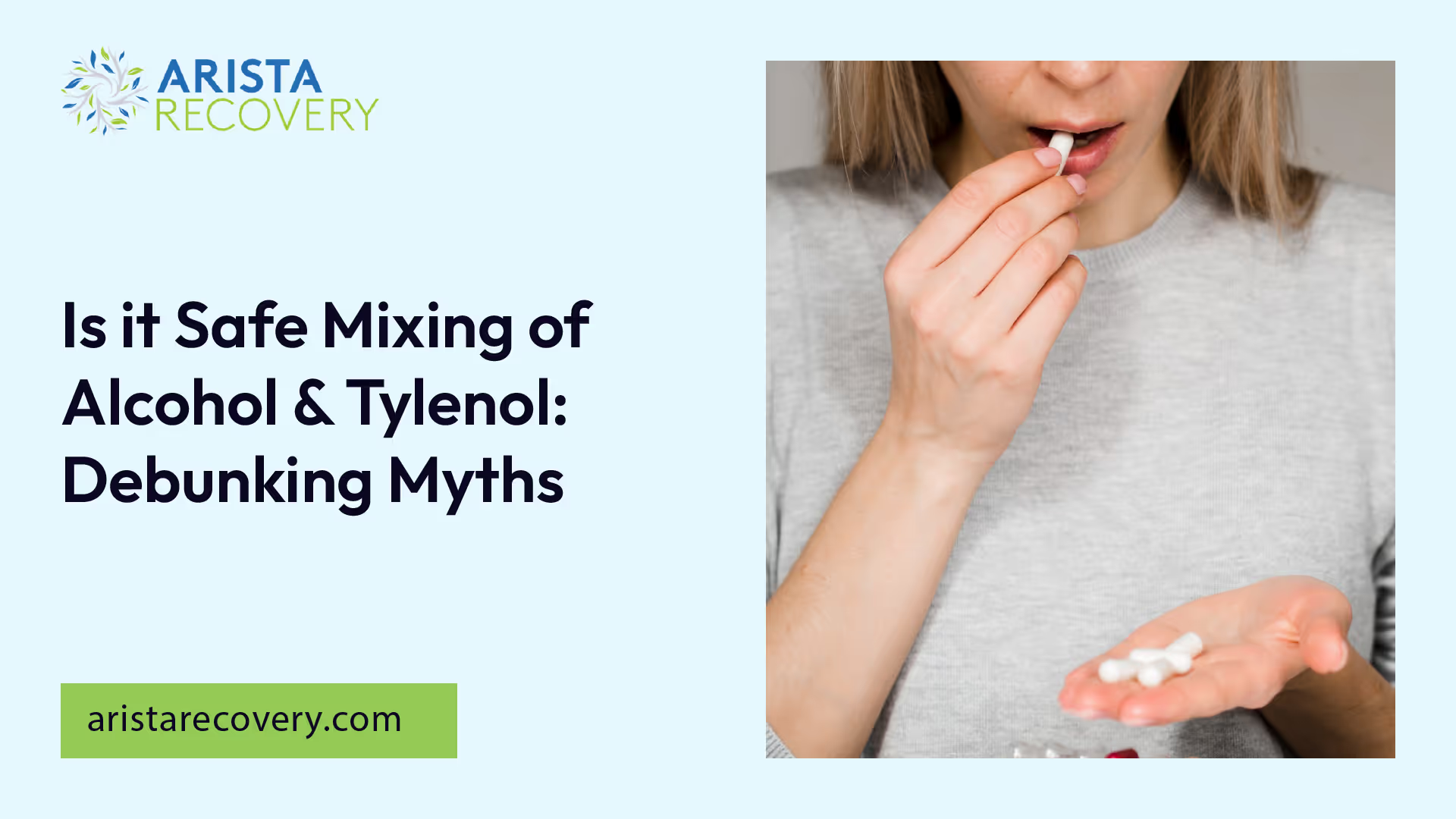Is it Safe Mixing of Alcohol & Tylenol: Debunking Myths

Alcohol and Acetaminophen Interaction
Understanding the interaction between alcohol and acetaminophen, a common over-the-counter pain reliever found in Tylenol, is crucial for anyone considering mixing these substances. This interaction can have significant effects on the body, particularly on liver function.
Understanding Liver Toxicity
A well-controlled clinical study showed that there was no increase in liver toxicity among alcoholic patients given the maximal therapeutic dose (4 g/day) of acetaminophen and no clinical evidence of increased risk for these patients when acetaminophen is used within recommended doses. This indicates that under certain conditions, the mixing of alcohol and acetaminophen may not be inherently harmful.

However, it's important to note that the liver is responsible for metabolizing both alcohol and acetaminophen. When these substances are present in the body at the same time, it can strain the liver and potentially lead to toxicity if not properly managed.
Effects of Alcohol on Acetaminophen
When alcohol enters the body, it increases the activity of CYP2E1, an enzyme involved in the metabolism of acetaminophen. This increased activity leads to the production of more NAPQI, a toxin that can accumulate in the liver and cause damage. Furthermore, alcohol decreases the production of glutathione, an antioxidant that helps neutralize NAPQI. This decrease in glutathione means that NAPQI is more likely to build up in the liver in dangerous concentrations.
It's also important to consider that taking acetaminophen at high doses or together with alcohol can cause several side effects, and the risk of severe side effects may be higher for people with an alcohol use disorder (AUD). A 2016 review highlights that the risk of acetaminophen-induced liver damage is higher for individuals who have AUD and also overdose on acetaminophen.
In conclusion, while it may be safe to mix alcohol and acetaminophen under certain circumstances and within certain limits, it's essential to understand the potential risks and effects on the body, particularly on liver function. Always consult with a healthcare provider before mixing any substances, including over-the-counter medications and alcohol.
Risks of Mixing Alcohol & Acetaminophen
When discussing the safety of mixing alcohol and acetaminophen (Tylenol), it's important to understand the potential risks and side effects. This includes the potential for dangerous side effects at high doses and an increased risk for individuals with Alcohol Use Disorder (AUD).
Side Effects of High Doses
Taking acetaminophen at high doses or in combination with alcohol can lead to several adverse effects. The severity of these effects may be higher for individuals with AUD, as observed by Medical News Today.
Furthermore, drinking frequently, taking the recommended dose of acetaminophen for extended periods, or mixing large amounts of alcohol with acetaminophen can make it more challenging for the body to eliminate harmful substances from acetaminophen. This can lead to severe liver damage.
The potential side effects of high doses of acetaminophen and alcohol include:
- Severe liver damage
- Increased risk of overdose
- Kidney damage
- Stomach bleeding
- Changes in mental status (confusion, hallucinations)
- Problems with coordination
It's crucial to be aware of these risks when considering whether it's safe to mix alcohol and Tylenol.
Increased Risk for Alcohol Use Disorder
The combination of alcohol and acetaminophen also carries a higher risk for individuals with Alcohol Use Disorder. A 2016 review highlighted that the risk of acetaminophen-induced liver damage is higher for individuals with AUD who also overdose on acetaminophen.
It's important to note that even in cases where the use of acetaminophen is within the recommended doses, individuals with AUD are at a higher risk due to the potential for liver damage. Therefore, individuals with AUD should consult with a healthcare professional before using acetaminophen, especially if they plan to consume alcohol.
In conclusion, while it may be safe for some individuals to mix alcohol and Tylenol under certain conditions, the risks and potential side effects should not be overlooked. Always consult with a healthcare professional before mixing any medications with alcohol.
Safe Usage Guidelines
Addressing the question of whether it's safe to mix alcohol and Tylenol (acetaminophen), it's crucial to understand the existing clinical studies on this subject and the recommendations for moderate consumption.
Clinical Studies on Safety
A well-controlled clinical study showed that there was no increase in liver toxicity among alcoholic patients given the maximal therapeutic dose (4 g/day) of acetaminophen. There was also no clinical evidence of increased risk for these patients when acetaminophen is used within recommended doses.
However, it's important to note that taking acetaminophen at high doses or together with alcohol can cause several side effects. This risk of severe side effects may be higher for people with alcohol use disorder (AUD). A 2016 review highlights that the risk of acetaminophen-induced liver damage is higher for individuals who have AUD and also overdose on acetaminophen [2].
Recommendations for Moderate Consumption
When it comes to combining acetaminophen and alcohol, moderation is key. As per Healthline, it is safe to mix acetaminophen and alcohol as long as acetaminophen is taken as directed and alcohol is consumed in moderation, defined as no more than three drinks per day.
Furthermore, it is usually safe to have one or two drinks around the same time as taking an occasional dose of acetaminophen. However, it is best to limit alcohol consumption and use the least amount of acetaminophen possible for the shortest time needed.
While these guidelines provide a general rule of thumb, individual responses can vary. It's always recommended to consult with a healthcare professional for personalized advice, especially for individuals with existing health conditions or those on other medications.
Factors Influencing Risks
The risk factors associated with the combination of alcohol and acetaminophen (Tylenol) are influenced by several aspects. Two significant factors are liver function and the frequency and dosage of the substances consumed.
Impact of Liver Function
The liver plays a critical role in metabolizing both alcohol and acetaminophen. When alcohol enters the body, it increases the activity of CYP2E1, a liver enzyme, causing an increased production of NAPQI, a harmful toxin. Simultaneously, alcohol decreases the production of glutathione, a substance that helps neutralize NAPQI. This dual effect results in NAPQI building up in the liver in dangerous concentrations.
Despite these findings, a well-controlled clinical study found that there was no increase in liver toxicity among alcoholic patients given the maximal therapeutic dose (4 g/day) of acetaminophen. This indicates no increased risk for these patients when acetaminophen is consumed within recommended doses.
Frequency and Dosage Considerations
The frequency and dose of acetaminophen and alcohol intake significantly influence the risk of liver damage. Consuming alcohol too frequently, taking the recommended dose of acetaminophen for longer than suggested, or mixing excessive amounts of alcohol with acetaminophen can complicate the body's ability to remove harmful substances from acetaminophen, leading to severe liver damage.
Moreover, a 2016 review indicated that the risk of acetaminophen-induced liver damage is higher for individuals who have alcohol use disorder (AUD) and also overdose on acetaminophen.
In conclusion, while some individuals might experience no negative effects when mixing acetaminophen and alcohol, the risk of serious health implications, including liver damage, is significantly higher, especially with frequent consumption, high dosages, or in individuals with AUD. Therefore, it is advisable to consult with a healthcare professional before deciding to mix these substances.
Health Implications
When discussing the potential safety of mixing alcohol and Tylenol, it's vital to understand the possible health implications. These can range from damage to the liver and kidneys, to long-term risks to vital organs.
Liver and Kidney Damage
One of the most severe health implications of mixing acetaminophen (Tylenol) and alcohol is potential liver damage. This damage can be severe or even life-threatening, highlighting the importance of exercising moderation and avoiding drinking more than recommended.
Furthermore, people with pre-existing liver damage, liver failure, or those who binge drink are at an increased risk of liver damage when using acetaminophen. These individuals should avoid alcohol and acetaminophen altogether.
In addition to liver damage, the combination of alcohol and acetaminophen can also lead to kidney damage. In fact, this mix can produce a 123% increased risk of kidney disease.
Long-Term Organ Risks
The risk of damage extends beyond the liver and kidneys. Combining alcohol and acetaminophen can result in serious, long-term damage to one's vital organs. Specifically, adding alcohol to acetaminophen increases the risk of side effects such as stomach bleeding, abdominal swelling, and liver damage.
Furthermore, the liver's ability to metabolize both substances can be compromised when alcohol and acetaminophen are combined, leading to liver damage and an increased risk of acute liver failure [6].
In conclusion, while it may seem harmless to mix alcohol with a common over-the-counter pain reliever like Tylenol, the potential health implications are serious and potentially life-threatening. Always consult with a healthcare provider before combining any medications with alcohol, and remember, moderation is key when it comes to alcohol consumption.
Seeking Professional Guidance
Understanding the effects of mixing alcohol and acetaminophen is crucial to preserving one's health. However, it's equally important to seek professional guidance when dealing with alcohol misuse issues or when unsure about the safety of combining these substances.
Importance of Medical Consultation
People with chronic liver disease should avoid alcohol and high doses of acetaminophen, and should not combine them. If an individual is unsure about their liver health, it's best to consult with a healthcare provider to assess it [4].
Individuals who have liver damage, liver failure, or who binge drink are at an increased risk of liver damage when using acetaminophen. Such individuals should avoid alcohol and acetaminophen altogether.
Drinking too frequently, taking the right dose of acetaminophen for longer than recommended, or mixing too much alcohol with acetaminophen can make the removal of harmful substances from acetaminophen more difficult for the body, leading to severe liver damage [3].
Addressing Alcohol Addiction
Alcohol is a highly addictive substance that is widely abused and can change the chemistry of the brain. If someone is abusing alcohol and unable to drink in moderation, professional help is needed to combat this addiction.
Chronic, prolonged use of alcohol can cause damage to vital organs. Combining acetaminophen with alcohol can worsen the risk of irreparable damage to the liver and kidneys. Individuals with alcohol use disorder are at an increased risk of kidney or liver failure when combining acetaminophen with alcohol [5].
In conclusion, it is important to always consult with a healthcare provider before mixing alcohol and acetaminophen, especially for individuals with existing health conditions or those who are struggling with alcohol addiction. Professional guidance is crucial to ensure the safe use of these substances and to address any potential health risks or addiction issues.
References
[1]: https://pubmed.ncbi.nlm.nih.gov/11776481/
[2]: https://www.medicalnewstoday.com/articles/322813
[3]: https://www.healthline.com/health/pain-relief/acetaminophen-alcohol
[4]: https://www.goodrx.com/acetaminophen/tylenol-and-alcohol
[5]: https://www.addictioncenter.com/alcohol/alcohol-acetaminophen/
You’re not alone in this.
When mental health challenges and addiction intersect, it can feel isolating. At Arista, we offer compassionate, evidence-based, and trauma-informed care to help you heal, grow, and move forward.
You’re not alone in this.
When mental health challenges and addiction intersect, it can feel isolating. At Arista, we offer compassionate, evidence-based, and trauma-informed care to help you heal, grow, and move forward.
Support that moves with you.
You’ve taken a brave first step. At Arista Recovery, we’re here to help you continue with best-in-class care designed for long-term healing and support.
.webp)






